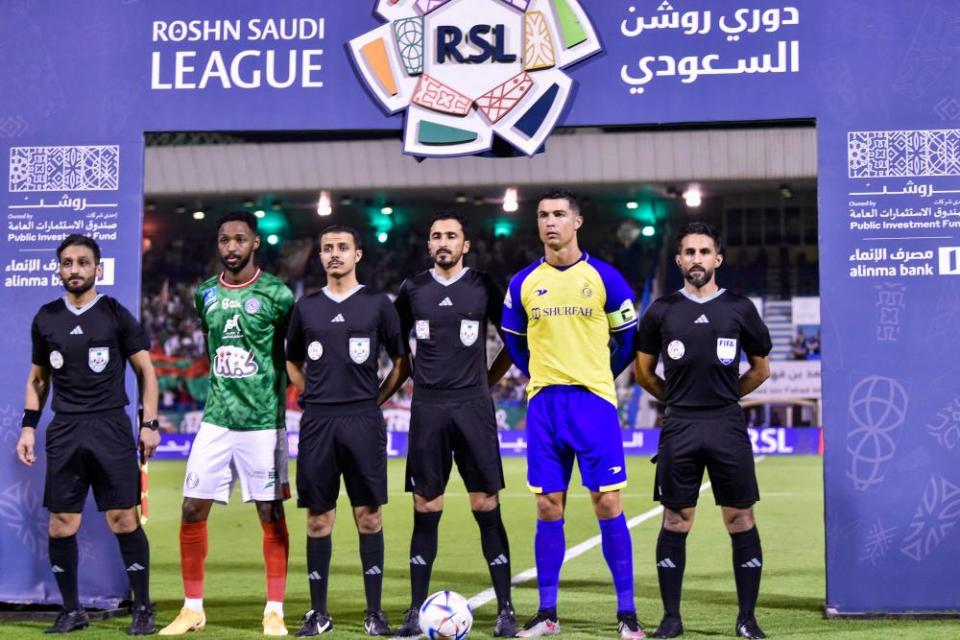For Saudi Arabia, rush of star football signings could be its most effective tool
Another day, another high-profile Champions League footballer being offered huge money to move to Saudi Arabia. Cristiano Ronaldo and Karim Benzama have signed up, N’Golo Kanté has agreed to join the party and although Lionel Messi rejected overtures and opted for Inter Miami, Sergio Busquets and Pierre-Emerick Aubameyang are among others being courted. It all forms part of a plan to use the sport to sanitise the country’s reputation.
If Tuesday’s in effect Saudi takeover of men’s golf was the kingdom’s most striking move yet, its football project is also making considerable waves. The Saudi football authorities are working to a blueprint that started long before the various Ballon d’Or winners were on the transfer radar, funded by the kingdom’s Public Investment Fund (PIF), which owns 80% of Newcastle United, and on Monday acquired 75% stakes in four Saudi clubs and is behind the golf manoeuvres. They have brought in experts to devise how to best make an impact, having also targeted boxing and Formula One as tools for reputational gain.
Related: PGA’s ‘merger’ with LIV can’t be seen as anything other than a Saudi victory | Ewan Murray
Among PIF’s quartet, Al-Nassr have Ronaldo, Al-Ittihad have signed Benzema and are poised to announce Kanté, Al-Hilal pursued Messi and want Aubameyang, and Al-Shabab, too, are after Aubameyang. Kanté has been offered about €100m (£86m) a year, Benzema and Ronaldo are being paid about twice that, and the money offered to Messi – a tourism ambassador for Saudi Arabia – dwarfed even those figures.
There is a long-held ambition in Saudi to host the World Cup, with a potential bid for 2030 being worked on. Reports have claimed talks were held with Egypt and Greece over a joint bid. The country’s leader, Mohammed bin Salman, can see the political gain in hosting the event after being marginalised by other nations for Saudi Arabia’s actions, including the murder of Jamal Khashoggi, the bombing of Yemen and restrictions of women’s rights.

Saudi Arabia is attuned to how sport could improve the country’s profile and draw positive attention. PIF first ploughed money into LIV golf and now that has merged with the PGA Tour and DP World Tour. World title boxing has been hosted but there is no legacy to the bouts. Ditto with Formula One. Football could be its most effective tool. Whereas golfers are participating in Saudi-backed tournaments, footballers are living in and conspicuously attached to the country.
Saudi Arabia has a huge football fanbase but often their eyes wander to the European game, which has made the domestic league a sideshow for many years. In the past their big-name signings have been over the hill or imports who would not have attracted the same attention in Europe. The country has a young demographic that can be tapped into and star names will focus their minds on domestic matters. The ambition to create an improved football infrastructure from top to bottom will be realised, too.
Ronaldo, Messi, Benzema and Kanté are in the autumns of their careers but Madrid did not want to lose Benzema, Barcelona were keen to bring Messi back and Chelsea have been in talks to extend Kanté’s contract.
The Saudis believe Al-Ittihad, Al-Ahli, Al-Nassr and Al-Hilal could each attract 70,000 supporters to home games if the right players are signed. Stadium atmospheres are an important part of a brand and such crowds would create a more marketable product in terms of foreign TV rights. In turn the hope is that this will make clubs more enticing to players in their prime. With each step comes potential benefits to the country’s reputation.
Related: Football transfer rumours: Son Heung-min and Wilfried Zaha to Saudi Arabia?
Key figures in Saudi football felt post-Covid was a good opportunity to bring in star names because the country would be seen as a more appealing place to live. Stadiums and facilities have been improved to bring them up to a standard that can be found in Europe’s top five leagues. All the league’s head coaches are foreign and attempts are being made to lure executives with experience at top European clubs, although convincing them to move is proving harder.
Saudi Arabia has seen what Qatar’s hosting of the World Cup did for its reputation, but also how the team failed. The Saudis aim to create a team that can make it to the knockout stages by 2030. By defeating the eventual winners, Argentina, in Qatar, Saudi Arabia showed their potential. Talks have been held with European clubs to help create pathways for young players.
The long-term strategies should mean the project does not fizzle out but whether the catalysts of Ronaldo and Benzema will be enough to make it a financial and political success remains to be seen.

 Yahoo Sport
Yahoo Sport 




































































